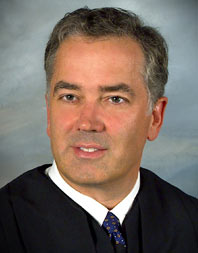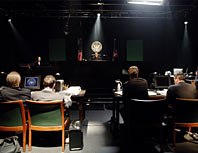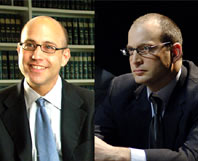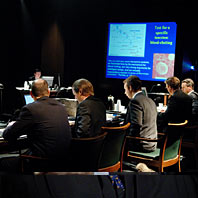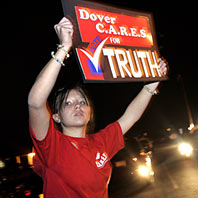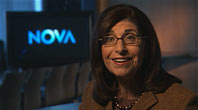A Q&A with Paula S. Apsell,
Senior Executive Producer
of NOVA
Q: This program tackles a contentious issue for many
people, particularly for many devout Christians. Why did
NOVA and Paul Allen's Vulcan Productions, your coproducer,
take it on?
Apsell:
Judgment Day: Intelligent Design on Trial is in many
ways a hornet's nest. And we had to think long and hard before
we decided to take it on. I think the real reason that we made
that decision is because evolution is the foundation of the
biological sciences. As Theodosius Dobzhansky, one of the
great biologists of the 20th century, once said, "Nothing in
biology makes sense except in the light of evolution."
In 2004, the Dover, Pennsylvania school board established a
policy that science teachers would have to read a statement to
biology students suggesting that there is an alternative to
Darwin's theory of evolution called intelligent design.
Intelligent design, or ID, claims that certain features of
life are too complex to have evolved naturally, and therefore
must have been designed by an intelligent agent. The Dover
high school science teachers refused to comply with the
policy, refused to read the statement. And parents opposed to
the school board's actions filed a lawsuit in federal court.
The trial that followed was fascinating. It was like a primer,
like a biology textbook. Some of the nation's best biologists
testified. When I began delving into the case, it was clear
that both the trial and the issue were perfect subjects for
NOVA.
Q: But why would a science series cover a court case?
Apsell: This is not just any case; it's an historic
case as well as a critical science lesson. Through six weeks
of expert testimony, the case provided a crash course in
modern evolutionary science, and it really hit home just how
firmly established evolutionary theory is. The case also
explored the very nature of science—how science is
defined. Perhaps most importantly, the trial had great
potential for altering science education and the public
understanding of science.
Dover's lawyers tried to argue that ID is science and,
therefore, that teaching it does not violate the principle of
the separation of church and state in the Establishment clause
of the U.S. Constitution. At the end of the trial, Judge John
Jones issued a 139-page verdict supporting the teaching of
evolution and characterizing intelligent design as a religious
idea with no place in the science classroom. It was a landmark
decision, all the more so because Judge Jones was appointed by
President Bush and nominated by Republican Senator Rick
Santorum.
If the decision had gone the other way, it could have had dire
consequences for science education in this country. We know
that state boards of education in Kansas and Ohio were
considering changing science standards and curriculums to
accommodate intelligent design, and they since have decided
against it in the wake of this verdict.
(Hear key excerpts from the verdict in
The Judge Speaks, and
learn more about what distinguishes science in
Defining Science.)
Q: Why is this topic—and the teaching of
evolution—so important?
Apsell: Recent polls tells us that 48
percent—almost half of all Americans—still
question evolution and still believe that some kind of
alternative should be taught in the public schools. What
happens when half of the population doesn't accept one of the
most fundamental underpinnings of the sciences? Evolution is
the absolute bedrock of the biological sciences. It's
essential to medical science, agriculture, biotechnology. And
it's critical to understanding the natural world around us.
We're a country built on our command of the sciences and
technology. But we now face a crisis in science literacy that
could threaten our progress in these areas and ultimately
threaten our quality of life. So, at NOVA and at Vulcan, we
feel that understanding the importance of evolution, and
enhancing science literacy in general, are more crucial than
ever.
Q: Does Judgment Day provide a fair representation
of the trial?
Apsell: I certainly think so, and Judge Jones, who
oversaw and ruled on the case, thinks the portrayal is quite
accurate. But I would invite anyone who wants to explore this
for themselves to actually read the court transcripts, which
are available, in full, through a
link on our Web site. They are fascinating.
We think intelligent design got a fair shake in the trial and
that it gets a fair shake in this program, since this is a
special two-hour program about the trial. Throughout the
six-week trial, Judge Jones gave both sides ample opportunity
to present their cases. NOVA's intention was never to retry
the case. And you will see in the program, just as in the
trial, a lot of time is given to intelligent design and its
proponents. Richard Thompson, the President and Chief Counsel
of the Thomas More Law Center, who represented the Dover
School District, himself says in our film, "We got a fair
trial," and that is the story NOVA tells.
Q: Of the three expert witnesses who testified on behalf of
Dover—Michael Behe, Scott Minich, and Steve
Fuller—only Steve Fuller appears in the program. Why
did you not interview the other two, who are among the
country's leading proponents of ID?
Apsell: Michael Behe and Scott Minich, as well as other
proponents of ID, were invited to participate in the program.
We were committed to presenting the views of the major
participants in the trial as fairly as possible. And our
preference would have been to have their views presented
directly, through firsthand interviews.
However, Michael Behe, Scott Minich, and other ID proponents
affiliated with the Discovery Institute declined to be
interviewed under the normal journalistic conditions that NOVA
uses for all programs. In the midst of our discussions, we
even offered to provide them with complete footage of the
interviews, so that they could be reassured that nothing would
be taken out of context. But they declined nonetheless.
In some sense, though, we do hear from both Behe and Minich in
the program through our recreated trial scenes; the words that
our actors speak are taken verbatim from the trial
transcripts. And of course we hear directly in the program
from lawyers for the defense—Richard Thompson, Patrick
Gillen, and Robert Muise—as well as from Phillip
Johnson, who is often credited as "the father of intelligent
design."
Q: Some critics might argue that NOVA didn't present the
entire trial, just parts of it biased toward a certain
perspective. How did you choose which sections of the court
transcripts to use?
Apsell: Certainly it's impossible for a two-hour-long
program to cover everything presented in a six-week trial. But
again, we worked hard to fairly represent what happened in
court. Our producers pored over all 3,000 pages of the court
transcripts. We wanted to capture the main arguments for both
sides, so the attorneys' summations were key to what we
finally selected.
In winnowing down the transcript of the trial, we made the
decision to stick to the scientific points. There were other
issues at play in this case—in particular, the factual
inconsistencies in the testimony given by some members of the
Dover school board. That issue played a large role in the
judge's verdict, and we cover it, but given our limited time
and NOVA's focus on science, we chose to highlight the
scientific arguments.
Q: NOVA is a documentary series. Why do dramatic
recreations at all?
Apsell: We are always cautious in making the decision
to use recreations. Kitzmiller v. Dover is a landmark
case that we wanted to cover, and there simply isn't any
footage of the trial since cameras and recording devices are
banned from federal courtrooms. We decided that the best way
to tell the story was to provide direct, verbatim access to
the trial through court transcripts. Dramatic reenactment
allowed us to do that.
And we use traditional documentary techniques to put the
reenactments in context. Pieces of the story are told or
expanded upon in NOVA's trademark style—through expert
interviews, state-of-the-art computer animations, and
documentary footage.
Q: Do you anticipate, in some sense, adding to the culture
wars by taking on this controversial subject?
Apsell: It's true that this subject can be very heated
and emotional for many people. The final film,
Judgment Day, demonstrates just that. What happened in
the small town of Dover, Pennsylvania was really quite
sad—parents and teachers and students all became pitted
against one another. Even family members, as we see in the
film, took different sides.
But the debate over teaching evolution is not simply a part of
the culture wars. It's a scientific issue. It's NOVA and
Vulcan's goal to help people understand the science, why it is
so essential to modern biology, and why most people believe
that evolutionary science is not incompatible with religion.
Q: Is evolution inherently anti-religious?
Apsell: Not at all. The view that evolution is
inherently anti-religious is simply false. Evolution tells us
is that the diversity of life on this planet could have arisen
by natural processes. But for many people of various faiths,
this is perfectly compatible with their belief in God as the
creator of all nature. I personally believe that the beauty of
evolution can enhance your belief in a creator and God.
By definition science cannot address the realm of the divine
or supernatural. This doesn't mean that science is
anti-religious.
And our program, Judgment Day, doesn't promote either a
religious or an anti-religious viewpoint. It accurately covers
a trial. And the trial itself did not have an anti-religious
viewpoint. I think it's worth noting that both the judge and
the majority of witnesses—including scientists on the
plaintiff side—are people of faith.

